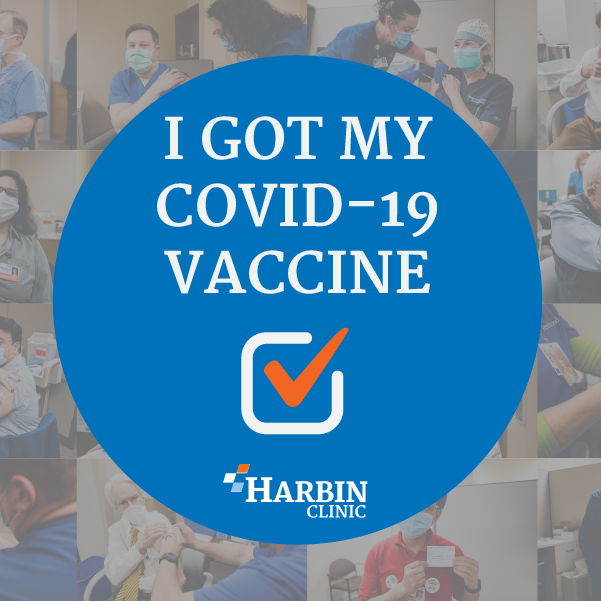Fact or Fiction? Our Physicians Discuss COVID Vaccine Myths

Chances are, you’ve heard various theories about the COVID-19 vaccine from the internet, social media, family members or friends, and it can be difficult to know what is true and what could be a myth. Depending on the source, information can be accurate while others provide misinformation or even make false claims.
At Harbin Clinic, we want to provide our patients and the community with accurate and reliable information about this vaccine. We spoke with five Harbin Clinic physicians specializing in different areas to debunk some of the most common myths about the COVID vaccine. If you have further questions, we encourage you to schedule an appointment with your doctor to discuss your concerns. Together, we can ensure our communities stay healthy and safe in the fight against COVID-19.
MYTH: I don’t want to get the COVID vaccine because it might cause me to have heart problems.
Answered by Henaro Sabino, MD, Pediatrician & Pediatric Cardiologist. FACT: Here is what we know that happens to teenagers and young adults when it comes to contracting COVID-19 and what occurs when receiving the vaccine. On one hand, if you get the coronavirus infection, there’s a potential for lasting cardio effects like multisystem inflammatory disorder (MIS-C), myocarditis, and potentially heart failure. On the other hand, what we know about COVID vaccine-related myocarditis is that it has a very limiting effect with only the need for Motrin for a few days and resolution. Given these consequences, we should encourage those to get the vaccine, especially if they have underlying heart conditions. We always encourage our patients to discuss their concerns with their doctors.
MYTH: The COVID-19 vaccine will enter my cells and change my DNA.
Answered by John Hostetler, MD, Infectious Disease physician. FACT: The purpose of all vaccines is to stimulate an immune response against organisms that would do us harm. This requires exposing our immune system to key proteins that are crucial in producing this response. Scientists already knew from other deadly coronaviruses (SARS, MERS) that the spike proteins on the surface of this virus hold the key to that response. The messenger RNA (mRNA) from the Moderna and Pfizer vaccines do enter the cell but not the nucleus of the cell where DNA resides. The mRNA teaches our cells to produce this spike protein to stimulate an immune response. Once that protein is made, the mRNA, along with the other stabilizing components of the vaccine, are cleared from our body, leaving us only with a defense system to counter future attacks from this virus.
MYTH: Children don’t get that sick from COVID, so they don’t need to get vaccinated.
Answered by Tammy Williams, MD, FAAP, Pediatrician. FACT: Unfortunately, children do get sick from COVID, and of the thousands hospitalized, nearly 1 in 4 are otherwise healthy. Children can also suffer long-term effects from COVID, such as respiratory problems, loss of smell and taste, fatigue, and other effects that can last for months. Additionally, children can pass the virus on to grandparents, other family members, and friends. The pediatricians at Harbin Clinic encourage everyone to vaccinate their children if they are age-eligible, and we are proud to share that we have all received the vaccine and so have our children who are old enough. We encourage you to speak with any one of your pediatricians about your concerns regarding the COVID vaccine.
MYTH: The COVID-19 vaccine can affect women’s fertility.
Answered by Marc Dean, MD, OB/GYN. FACT: The COVID-19 vaccine will not affect fertility, and there is currently no evidence that the vaccine causes problems throughout a woman’s pregnancy, including the development of the placenta. Additionally, there is no evidence that any vaccinations (this includes the COVID-19 vaccine) impact fertility.
The COVID-19 vaccine helps the body create copies of the spike protein found on the coronavirus’s surface, which allows the body to fight the virus if exposed. The confusion began when an article circulated on social media earlier this year stating that this spike protein is the same spike protein involved in the growth and attachment of the placenta during pregnancy (called syncytin-1). The false article stated that getting the COVID-19 vaccine would cause a woman’s body to fight this spike protein and affect her ability to become pregnant.
These two spike proteins are completely different and getting the COVID-19 vaccine doesn’t impact a woman’s ability to get pregnant, including through in vitro fertilization methods. The American College of Obstetricians and Gynecologists (ACOG) and the Society for Maternal-Fetal Medicine (SMFM) recommend that women who are pregnant, breastfeeding, or planning to become pregnant receive the vaccine. They note that the risk of complications and hospitalization is significantly higher for pregnant women who contract COVID-19.
MYTH: The COVID-19 vaccine is so new, and we don’t know the long-term effects.
Answered by Jennifer Barbieri, MD, FCCP, Pulmonologist & Critical Care physician. FACT: Four critical factors led to the unprecedented speed at which these COVID-19 mRNA (messenger RNA) vaccines were approved for use by the FDA.
mRNA technology has been in development for decades, and in the 2000s, the technology improved exponentially. Additionally, mRNA vaccines do not utilize live viruses, so they can be manufactured quickly in large quantities in a cell-free process that does not involve preservatives or materials of animal origin.
Once the candidate vaccines were shown to be safe and the genetic sequence was identified, the US government provided the financial backing to conduct large-scale clinical trials with both vaccines in July of 2020. Many volunteers quickly stepped up to participate in these seminal trials. In terms of the size and safety oversight, these studies were at least equal to or exceeded the same FDA standards applied to all other vaccines in common use today.
Because COVID-19 was so common when these studies were launched in 2020, it did not take long to quickly show a difference in the incidence of infection between those who received the vaccine and those who did not. Now with the Delta variant circulating as the dominant strain, we are seeing that the vaccine results in significantly fewer hospitalizations and deaths compared to those who are unvaccinated. The safety of these vaccines was also quite apparent, with only rare severe adverse reactions.
Based upon the preponderance of evidence from these early clinical trials, the FDA determined the vaccines to be both safe and effective. As such, the FDA issued emergency use authorization for several vaccines even as controlled clinical trials were being completed. As a result, we now have in effect post-marketing data from the widespread utilization of COVID-19 vaccines in addition to the evidence coming from the controlled clinical trials.
The CDC continuously monitors and publishes any significant safety concerns, and these can be found on their website. Manufacturers of the vaccines have applied for formal FDA approval of their respective vaccines, with FDA approval anticipated no later than December 2021.
If you have questions about the COVID vaccine or would like to schedule an appointment to receive it, contact your physician’s office or visit https://www.vaccines.gov/


